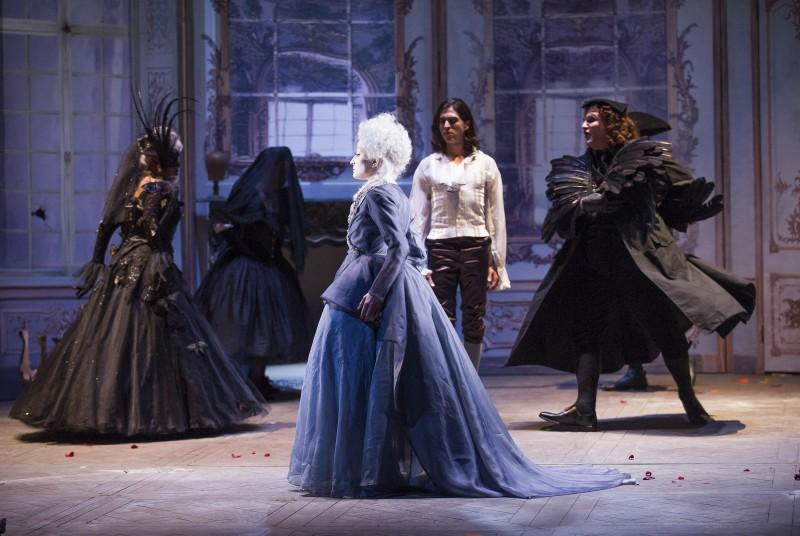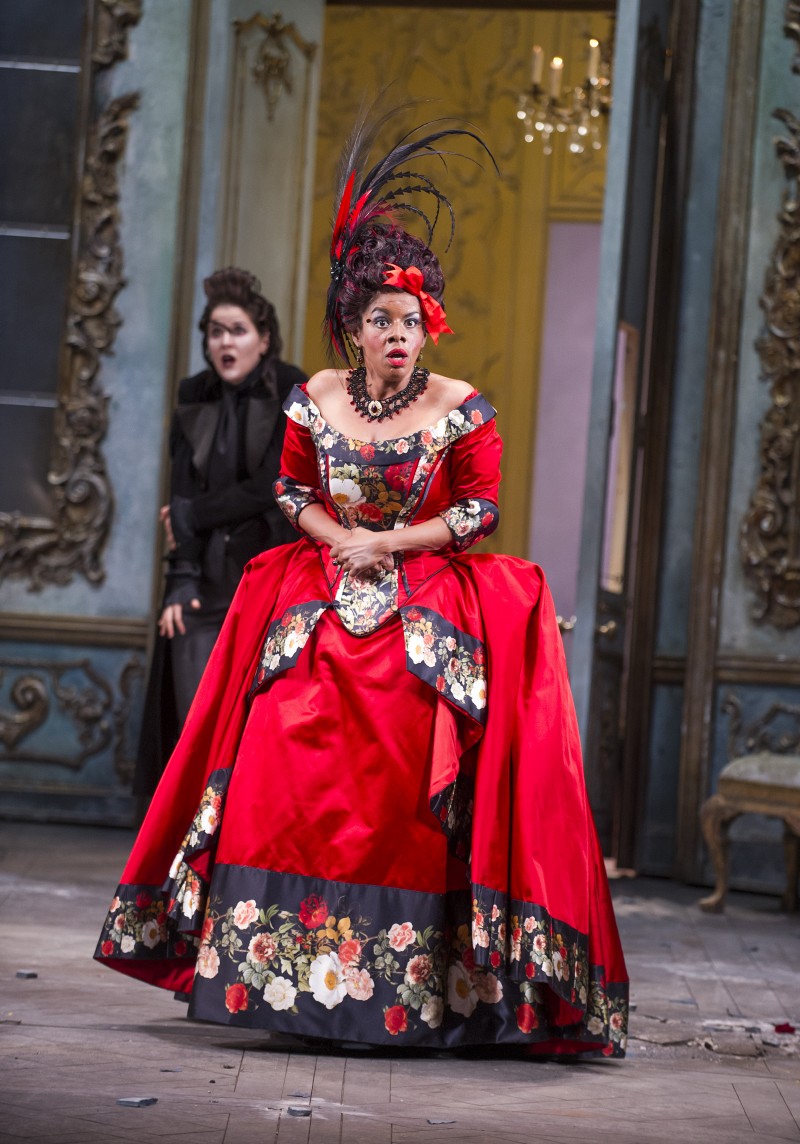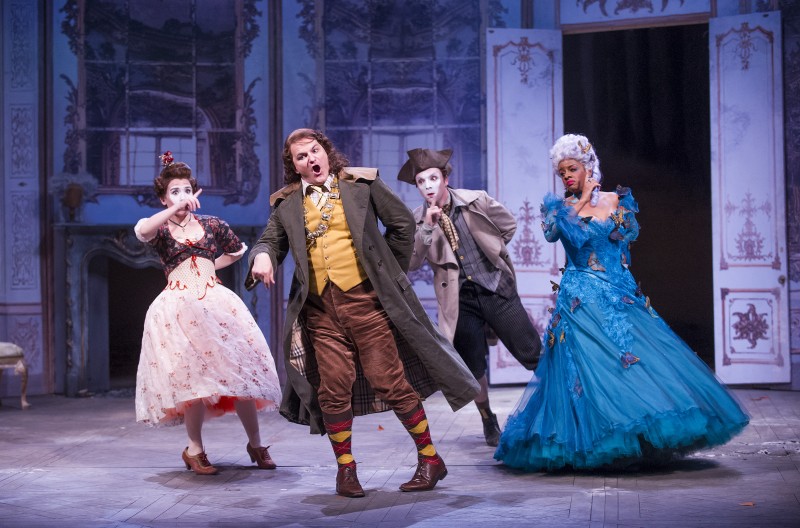La finta giardiniera, Glyndebourne | reviews, news & interviews
La finta giardiniera, Glyndebourne
La finta giardiniera, Glyndebourne
Cast, conductor and orchestra work hard, but Mozart's early farrago remains a shambles

There are two avenues down which to approach the well-kept flower beds of Mozart’s early operas. One is to be surprised how rarely the muse of fire which rages through Idomeneo, his first undisputed masterpiece, descends on a work composed just a few years earlier like La finta giardiniera (The Counterfeit Garden Girl), and that’s how I felt sitting through a performance of it for only the second time in my life.
He has the finest of period-instrument orchestras, and seven of the best singers, to support him. Unfortunately they don’t have that much great material to work on, and the shambolic plot/libretto is further obfuscated by Frederic Wake-Walker’s strange, oblique idea of elucidation. I can see what he’s getting at. The characters are all “finti”, faking it, to begin with; the walls of illusion need to be broken down before they can truly love. Each concept, though, takes an act apiece to hammer home. In the first, it’s the 18th-century poses which are done to death, so that you’re screaming for them to stop by the time of the ensemble which brings down the curtain (and at least there are ensembles, if not yet quite in the differentiated vein of Mozart's later operas). In the second, you can see from the off that Anthony McDonald’s beautifully designed replica of an 18th-century pleasure-palace chamber is due for steady demolition; again, the conceit outstays its welcome. And nothing is funny.
 Most baffling is the decision to keep all the action indoors until the Lustschloss room belatedly gives way to a painted sylvan scene. So no-one unfamiliar with the plot would have a clue that the heroine, the Marchesa Violante, is disguised as a girl gardener to the local mayor; and when she’s supposed to be groping in the dark among the perils of the libretto’s “deserted mountainous spot with ancient, partly ruined acqueducts” and a “dark grotto”, the lights go up full blaze on the crumbling salon, leaving her only the fireplace in which to hide.
Most baffling is the decision to keep all the action indoors until the Lustschloss room belatedly gives way to a painted sylvan scene. So no-one unfamiliar with the plot would have a clue that the heroine, the Marchesa Violante, is disguised as a girl gardener to the local mayor; and when she’s supposed to be groping in the dark among the perils of the libretto’s “deserted mountainous spot with ancient, partly ruined acqueducts” and a “dark grotto”, the lights go up full blaze on the crumbling salon, leaving her only the fireplace in which to hide.
Very well, so literalism needn’t be the key here. But we need all the clarity we can get, not so much on the “x loves y who loves z” imbroglio as on Sandrina/Violante’s motivations in going back several times on the resolve to reveal herself to the lover who tried to murder her. Even Wake-Walker’s conceit, that in the temporary madness of the main couple lies the truth, confuses, and some clumsy cuts don’t help the final stages where the music is finally at its most consistent best.
Perhaps it’s a tall order to try and bring psychological interest to the work’s inconsistent characterisations, but I can’t help feeling Wake-Walker might have worked more with the temperaments of his sympathetic singers. Dramatically the most flamboyant is the wonderful Nicole Heaston as the mayor’s capricious niece Arminda (pictured above right with Rachel Frenkel's Ramiro). This is no role for her to shine consistently in, as she did when I saw her playing Handel’s Alcina in Oslo, but she carries off one of Mozart’s two rather splendid Sturm and Drang numbers with aplomb, and looks terrific in her flouncy costumes. Glyndebourne’s character tenor of choice, Wolfgang Ablinger-Sperrhacke (pictured below with Joélle Harvey, Gyula Orendt and Heaston), gets the chance to sing a little more beautifully than usual, and keeps it low-key as the foolish mayor Don Anchise, probably because he knows that in this production he's not going to make people laugh much, while the trousers role of Ramiro gave lustrous mezzo Frenkel a fine spotlight in the manner, if not the matter, of her big second act number
 The comic underling roles aren’t so much fun, but Harvey, such a captivating Susanna in the Tour production of Michael Grandage’s superb Nozze di Figaro, strikes poses well and tries hard to keep the earthy Serpetta sparkling, while we had an interesting situation with her Nardo: Orendt had developed a throat infection in the course of the day, so he sang the recits while his arias and his part in the ensembles were taken from the dress circle side of stage by Gavan Ring. He deserved the biggest applause for his superb élan in the fizziest number with its energetic violin titters, Nardo’s Act 1 railing against woman transposed to try and give extra focus to an abbreviated Act 3.
The comic underling roles aren’t so much fun, but Harvey, such a captivating Susanna in the Tour production of Michael Grandage’s superb Nozze di Figaro, strikes poses well and tries hard to keep the earthy Serpetta sparkling, while we had an interesting situation with her Nardo: Orendt had developed a throat infection in the course of the day, so he sang the recits while his arias and his part in the ensembles were taken from the dress circle side of stage by Gavan Ring. He deserved the biggest applause for his superb élan in the fizziest number with its energetic violin titters, Nardo’s Act 1 railing against woman transposed to try and give extra focus to an abbreviated Act 3.
Mozart’s most prophetically inventive music goes, as it should, to the predicament of the heroine and the lover who tried to kill her in a fit of jealousy – a pre-action event spelled out during the overture where we seem to be presented with the scenario that Strauss and Hofmannsthal’s Octavian might have stabbed his Marschallin during their night of passion and now needs to get the hell out of there. Only this young blade really is not a mezzo in disguise but a handsome youth, tenor Joel Prieto, who sings prettily but with not quite enough of the backbone occasionally needed for Count Belfiore’s more wayward expressions.
The countess-as-garden-girl who can’t help loving her assailant is taken with plenty of character and stylistic beauty by the very classy Christiane Karg, Aricie in Glyndebourne’s revelatory Rameau – oh, for more of that – last year. You can really hear the dividends of intensive work between singer, conductor and orchestra at Glyndebourne pay off in her sotto voce cavatina of despair with muted strings There’s splendid work here, as throughout, from the Orchestra of the Age of Enlightenment reunited with Ticciati, but it’s not enough, and the way Don Anchise draws our attention to the lovely scoring for flute and oboes in his first aria leaves you expecting much more instrumental felicity than Mozart delivers. Still, the final duet when Violante and Belfiore re-commit brings the highest Mozartian standards all round. If only the 18-year-old composer had more to ask in that league throughout.
rating
Explore topics
Share this article
Add comment
The future of Arts Journalism
You can stop theartsdesk.com closing!
We urgently need financing to survive. Our fundraising drive has thus far raised £49,000 but we need to reach £100,000 or we will be forced to close. Please contribute here: https://gofund.me/c3f6033d
And if you can forward this information to anyone who might assist, we’d be grateful.

Subscribe to theartsdesk.com
Thank you for continuing to read our work on theartsdesk.com. For unlimited access to every article in its entirety, including our archive of more than 15,000 pieces, we're asking for £5 per month or £40 per year. We feel it's a very good deal, and hope you do too.
To take a subscription now simply click here.
And if you're looking for that extra gift for a friend or family member, why not treat them to a theartsdesk.com gift subscription?
more Opera
 Albert Herring, English National Opera review - a great comedy with depths fully realised
Britten’s delight was never made for the Coliseum, but it works on its first outing there
Albert Herring, English National Opera review - a great comedy with depths fully realised
Britten’s delight was never made for the Coliseum, but it works on its first outing there
 Carmen, English National Opera review - not quite dangerous
Hopes for Niamh O’Sullivan only partly fulfilled, though much good singing throughout
Carmen, English National Opera review - not quite dangerous
Hopes for Niamh O’Sullivan only partly fulfilled, though much good singing throughout
 Giustino, Linbury Theatre review - a stylish account of a slight opera
Gods, mortals and monsters do battle in Handel's charming drama
Giustino, Linbury Theatre review - a stylish account of a slight opera
Gods, mortals and monsters do battle in Handel's charming drama
 Susanna, Opera North review - hybrid staging of a Handel oratorio
Dance and signing complement outstanding singing in a story of virtue rewarded
Susanna, Opera North review - hybrid staging of a Handel oratorio
Dance and signing complement outstanding singing in a story of virtue rewarded
 Ariodante, Opéra Garnier, Paris review - a blast of Baroque beauty
A near-perfect night at the opera
Ariodante, Opéra Garnier, Paris review - a blast of Baroque beauty
A near-perfect night at the opera
 Cinderella/La Cenerentola, English National Opera review - the truth behind the tinsel
Appealing performances cut through hyperactive stagecraft
Cinderella/La Cenerentola, English National Opera review - the truth behind the tinsel
Appealing performances cut through hyperactive stagecraft
 Tosca, Royal Opera review - Ailyn Pérez steps in as the most vivid of divas
Jakub Hrůša’s multicoloured Puccini last night found a soprano to match
Tosca, Royal Opera review - Ailyn Pérez steps in as the most vivid of divas
Jakub Hrůša’s multicoloured Puccini last night found a soprano to match
 Tosca, Welsh National Opera review - a great company reduced to brilliance
The old warhorse made special by the basics
Tosca, Welsh National Opera review - a great company reduced to brilliance
The old warhorse made special by the basics
 BBC Proms: The Marriage of Figaro, Glyndebourne Festival review - merriment and menace
Strong Proms transfer for a robust and affecting show
BBC Proms: The Marriage of Figaro, Glyndebourne Festival review - merriment and menace
Strong Proms transfer for a robust and affecting show
 BBC Proms: Suor Angelica, LSO, Pappano review - earthly passion, heavenly grief
A Sister to remember blesses Puccini's convent tragedy
BBC Proms: Suor Angelica, LSO, Pappano review - earthly passion, heavenly grief
A Sister to remember blesses Puccini's convent tragedy
 Orpheus and Eurydice, Opera Queensland/SCO, Edinburgh International Festival 2025 review - dazzling, but distracting
Eye-popping acrobatics don’t always assist in Gluck’s quest for operatic truth
Orpheus and Eurydice, Opera Queensland/SCO, Edinburgh International Festival 2025 review - dazzling, but distracting
Eye-popping acrobatics don’t always assist in Gluck’s quest for operatic truth
 MARS, Irish National Opera review - silly space oddity with fun stretches
Cast, orchestra and production give Jennifer Walshe’s bold collage their all
MARS, Irish National Opera review - silly space oddity with fun stretches
Cast, orchestra and production give Jennifer Walshe’s bold collage their all

Comments
So it would be a rather
I don't know whether you were
I don't know whether you were there last night, Onesti, but I fear your irony is well deserved. Not because the 'gardener' idea is seminal but because the contrast between a formal garden and a scene set outside the boundaries amidst savage nature is full of stronger dramatic possibilities than I think FWW discovered.
I've just dug out my old 1986 Camden Festival programme because I remember exactly that being explored by one Robert Carsen, he of the immortal Carmelites production, for Park Lane Opera. It was much more striking as drama then. Though Janis Kelly as Serpetta has left the strongest impression, I see we also had Alison Hagley, Adrian Thompson and Anne Mason.